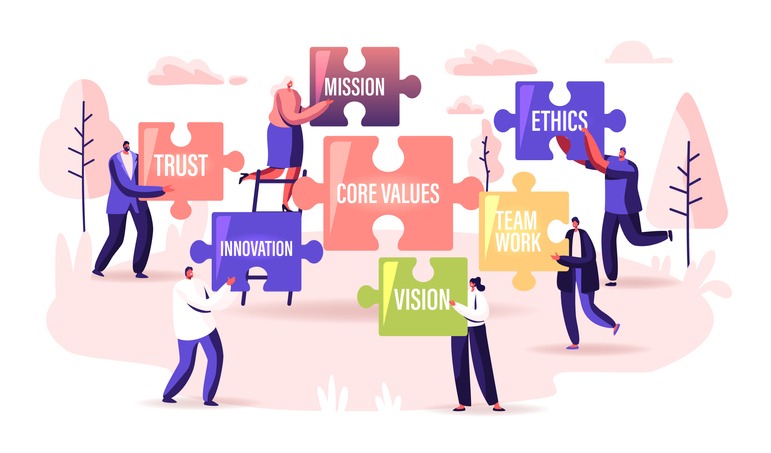
Being an ethical leader is more than just having strong values – find out what it takes here with these 10 tips
CREDIT: This is an edited version of an article that originally appeared on Business News Daily
Ethical leadership is the practice of demonstrating appropriate conduct inside and outside the office. It is mainly concerned with moral development and virtuous behaviour. Ethical leaders display good values through their words and actions.
Here’s how to become an ethical leader.
Define and align your values
Consider the morals you were raised with: Treat others how you want to be treated, always say thank you, help those who are struggling, etc. But as you grow and society progresses, conventions change, often causing values to shift.
“This is the biggest challenge ethics face in our culture and at work and is the biggest challenge ethical leadership faces,” said Matthew Kelly, founder of Floyd Consulting and author of The Culture Solution (Blue Sparrow Books, 2019). “What used to be universally accepted as good and true, right and just, is now up for considerable debate. This environment of relativism makes it very difficult for values-based leaders.”
Ask yourself what matters to you as an individual, and then align that with your priorities as a company leader. Defining your values not only expresses your authenticity, but also encourages your team to do the same, creating a shared vision for all workers. Kelly said that to succeed with ethical leadership, business owners should demonstrate how adhering to specific values benefits the organisation’s mission.
“Culture is not a collection of personal preferences,” he said. “Mission is king. When that ceases to be true, an organization has begun its journey toward the mediocre middle.”
Hire people with similar values
While your values don’t need to be identical to those of your workers, you should be able to establish common ground with them. This often starts with the hiring process and is maintained through a vision statement.
“I do not believe that every person is a fit for every company, and that is OK,” said Shane Green, author of Culture Hacker (Wiley, 2017). “Companies need to do a better job ensuring they find people who are aligned with their values rather than just hiring for experience.”
In fact, Kelly believes hiring employees with different experiences and perspectives are valuable because they each offer their own solutions to challenges.
“But when it comes to values, I think having and hiring people who share your values is critical,” he said. “Nobody wants to work for somebody who doesn’t share their values … Without mutual respect, it is very difficult to form a dynamic team, and most people find it very difficult to respect someone who doesn’t share their values.”
The same mentality should apply to choosing business partners, consultants, suppliers and even customers. Your ethical values must align across all your business operations. Learn more about hiring for cultural fit.
Promote open communication
With each decision you make, be transparent and encourage feedback from your team. This helps you become a better leader and allows your workers to feel more confident sharing their ideas or concerns.
“I believe that one of the important responsibilities for the modern company is to create an environment where open communication is encouraged and that, more importantly, people are listened to,” Green said. “We are seeing a lot of employees calling on their companies to change policies, drop customers or take a stand on current issues. Companies cannot bend to every employee’s demand, but what they do need to start executing is creating forums where employees can raise their viewpoints, feel they are listened to and receive follow-up explaining why certain things can or cannot happen.”
Gathering feedback from your team helps you improve as a leader and propels your business forward. “Management is all about the people,” said Alain Gazaui, co-founder and CEO of SpaKinect. “Understanding where they come from is crucial.”
Beware of bias
As humans, many of us have beliefs, subconscious or otherwise, that are outdated or erroneous. No leader wants to admit their flaws, but failure to practice self-awareness can have detrimental consequences.
“Everyone has bias, but for the longest time, you were not called out on it because you were never really challenged,” Green said. “Now that the workforce is more diverse … some unexposed biases are being called out. Managers need to … look at themselves and be honest that they do in fact have biases that may impinge on another person feeling comfortable at work.”
Recognise the biases, preconceived notions and stereotypes in every situation, and be sure you’re not doling out unfair treatment as a result of them.
Lead by example
To build an ethical company, you must start from the top down. Your employees will see your behaviour, choices and values and adopt them in their own practices.
“To effectively lead, the ethical leader walks the line he or she wants others to follow,” Younger said. “Leading by example is the best way to ensure an ethical business.”
Leading by example means displaying the characteristics and behaviours you want your staff to embrace and practice. It instils respect and lets your employees know that you truly believe in them and trust them to work in accordance with the example you’ve set.
Don’t be afraid to admit mistakes
As the saying goes, to err is human. When mistakes are made, thoughtful and ethical leaders put their egos aside and hold themselves accountable. If something goes wrong, don’t make excuses or try to downplay the damage. Instead, be honest, admit what happened, apologise if needed and share a proposed recovery plan with all stakeholders.
Don’t shy away from assuming full responsibility for negative actions and mistakes made by your employees. Present yourself as a strong, caring leader who stands by their team and is focused on finding solutions rather than pointing fingers.
Find your role models
“There are many [ethical] leaders throughout history,” said Mike Sheety, director of ThatShirt. “Do a little research of good, powerful leaders, and try to identify what they do [well]. Then, implement it into your own leadership style.”
Some examples of stellar ethical leaders are Mahatma Gandhi, Martin Luther King Jr., Warren Buffett, Eleanor Roosevelt, Howard Schultz (former CEO of Starbucks Coffee), Dame Anita Roddick (founder of The Body Shop), James Burke (former CEO of Johnson & Johnson) and Andy Grove (former CEO of Intel Corporation). Study their careers, wins and mistakes to learn what to emulate, how to rebound from missteps and how their experiences can influence the way you ethically lead others at your own company.
Embed corporate social responsibility into your business strategy
Corporate social responsibility (CSR) is a form of business self-regulation with the aim of practising social accountability and commitment to make a positive impact on society. There are many ways in which your company can embrace CSR. For instance, you can ensure you’re being eco-conscious; promote equity, diversity and inclusion in the workplace; give back to the community; and treat your employees with respect.
The danger, however, lies in launching disjointed CSR initiatives rather than implementing a holistic program that aligns with your business’s values and goals. That is likely to undermine your brand, signalling to your customers and employees that you might be doing this solely for the sake of appearances. Instead, as an ethical leader, facilitate CSR initiatives that correspond to your business’s mission, vision and goals, and ensure they are integrated into your company strategy and workplace culture.
Do your reading
You can expand your general understanding of ethics through the classic works of Jeremy Bentham (the father of utilitarianism), John Stuart Mill and Peter Singer. Similar to learning from role models, these leaders in the field can teach you the philosophies behind applied ethics so you better comprehend the principles you should hold fast in the workplace and why.
If you want to learn how ethical theory applies to modern management, look at Peter Drucker’s works. Drucker’s management theory revolves around the concepts of decentralization, knowledge work, management by objectives and setting SMART (specific, measurable, achievable, relevant, time-specific and recorded) goals for your employees. Drucker advocated for creative rather than bureaucratic management, where leaders treat their team with respect and make them feel valued, encourage collaboration and innovation, and make socially conscious business decisions.
Care for yourself so you’re able to care for others
You can’t pour from an empty cup. Leaders who take care of themselves and regularly refill their metaphorical cup are more likely to manage better and care for others.
“Having a calm and capable demeanour is the foundation for strong leadership,” said Christine Matzen, founder of Oak Street Strategies. “This can be accomplished through making sure that you, as a leader, are focused on meeting your own needs, [like] sleep, nutrition [and] true connection with loved ones.”
Matzen said that devoting time to self-care might sound simple, but it’s critical to support your capabilities as a leader. “The leader that is happy and content in life wants happiness and contentment for those they lead.”


Be the first to comment